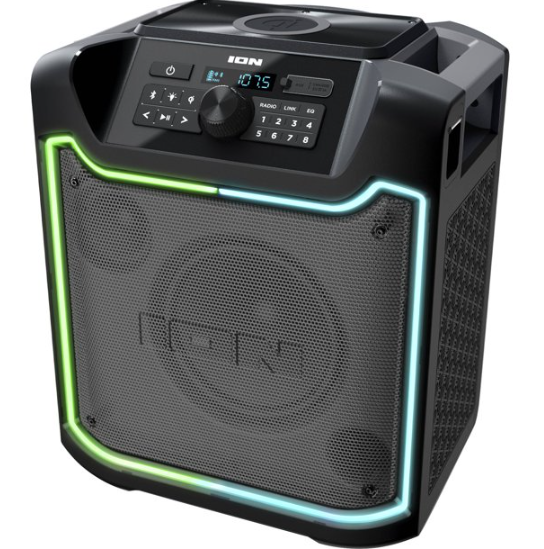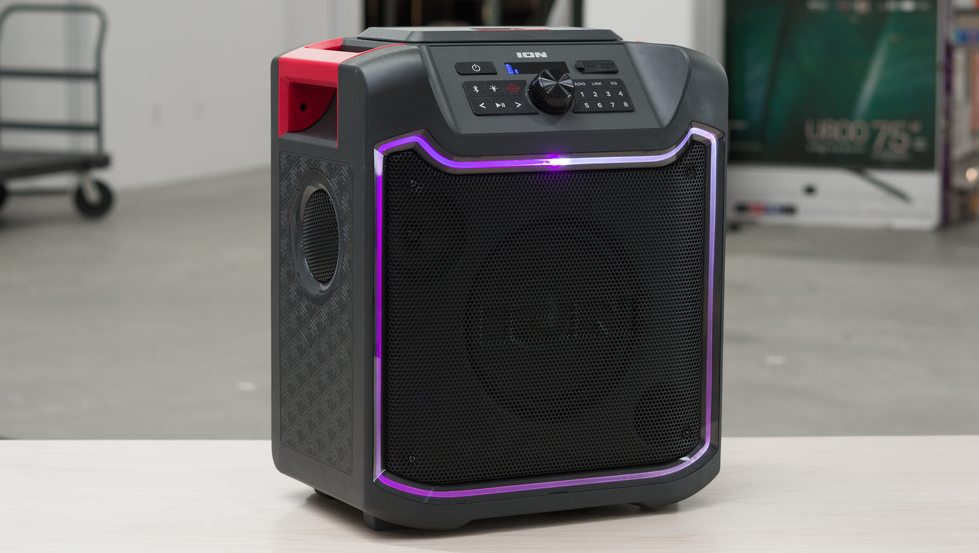ION IPA125 Trailblazer All-Weather Speaker with Bluetooth and QI Wireless Charging

Support
For the full User Guide and the latest information about this product, visit ionaudio.com. For additional product support, visit ionaudio.com/support.For complete warranty information: visit ionaudio.com/warranty.
Technical Specifications
- Water Resistance Class: IPX5
- Output Power: 120 W (peak)
- Frequency Response: 65 Hz – 16 kHz (-3 dB)
- Drivers: Low-Frequency: 8” / 203 mm
- High-Frequency: 3” / 76 mm
- Bluetooth Profile: A2DP, AVRCP; Module: v5.0 Bluetooth Range: Up to 100 ft. (30.5 m) (Bluetooth range is affected by walls, obstructions, and movement. For optimal performance, place the product in the center of the room so it is unobstructed by walls, furniture, etc.)
- USB Charging Port: 5 VDC, 1 A
- Specifications are subject to change without notice.
- Aux Input: 3.5 mm (1/8”) line-level
- Battery:
- Battery Life*: Up to 90 hours
- *Battery life may vary based on temperature, age, and volume usage of product.
- Battery Recharge Time: Up to 10 hours Power: IEC320 C7 Power Cable
- Input Voltage: 100–240 VAC, 50/60 Hz Dimensions (WxDxH): 14.6″ x 10.2″ x 17.5″ / 370 x 260 x 444 mm
- Weight: 22.91 lbs. / 10.4 kg
Trademarks and Licenses
ION Audio is a trademark of inMusic Brands, Inc., registered in the U.S. and other countries. App Store is a trademark of Apple Inc., registered in the U.S. and other countries. Android and Google Play are registered trademarks of Google Inc. The Bluetooth word mark and logos are owned by the Bluetooth SIG, Inc. and any use of such marks by ION Audio is under license. All other product names, company names, trademarks, or trade names are those of their respective owners.
Trailblazer Quickstart Guide
Features (See image, right)IMPORTANT: Fully charge the battery before using.

- A. Power Button: Press and hold this button to turn Trailblazer on or off.
- B. Bluetooth Button: Press the Bluetooth button to pair to a Bluetooth device or disconnect a paired Bluetooth device. See below to learn more.
- C. Light Mode Button: Press this button to select how the lights on the front panel function. See the full User Guide to learn more.
- D. Qi Button: To wirelessly charge your Qi-compatible device, place it on top of the Qi charging area and press this button to enable charging. When a successful charging connection is made, the blue Qi LED will slowly flash to indicate the device is charging.
- E. Radio Selector: Press this button to set the radio to FM 1, FM 2, and Off.
- F. Link: Press and hold this button to start stereo linking to another compatible ION speaker (see ionaudio.com for a list of compatible speakers). Then, repeat this process on the other speaker.
- G. EQ: Press this button to access controls to adjust the treble and bass.
- H. Previous: Press this button to tune in a radio station or go to the previous track on a Bluetooth connected device. Press and hold in radio mode to seek.
- I. Play/Pause: Press to play or pause a track from a connected Bluetooth device.
- J. Next: Press this button to tune in a radio station or go to the next track on a Bluetooth connected device. Press and hold in radio mode to seek.
- K. Radio Preset Buttons: In Radio Mode, save the current station as a preset by pressing and holding a numbered button. Press a numbered button to select a previously saved preset station.
- L. Display: This screen shows information relevant to Trailblazer’s current operation. See the full User Guide to learn more.
- M. Control Knob: This adjusts the speaker’s main mix volume, which includes the Auxiliary Input, Radio, and the audio of a paired Bluetooth device. Turn this knob in EQ mode to adjust the treble and bass frequencies.
- N. Auxiliary Input: This stereo 1/8” (3.5 mm) input can be used to connect a CD player, MP3 player, or other audio source.
- O. USB Charging Port: Connect your device’s charge cable here to charge it. USB charging only functions when the unit’s power is turned on.
App Control
IMPORTANT: To ensure the best possible experience with the app, use the most current Android OS or iOS on your device.Note: Ensure that your device has internet access via your service provider or wireless connection. You can also download the app on your computer, but remember to connect and sync your device to transfer the app.Follow these steps to download the free app on your device:
- Open the Apple App Store or Google Play on your device. Then, search for the ION Sound XP app.
- Follow the on-screen instructions to download and install the app. Once downloaded, the ION Sound XP app will appear on your device’s home screen.
- To use the app, you must first connect your device to Trailblazer via Bluetooth. See the directions below to learn how to do this.For complete instructions on using the app, download the complete User Guide at ionaudio.com.
Pairing with a Bluetooth Device
- Make sure the speaker is within range of your Bluetooth device (no more than 100 ft. / 30.5 m away).
- Press the Bluetooth button on the speaker.
- Navigate to your Bluetooth device’s setup screen. Then find and select Trailblazer. Do not connect to Trailblazer_BLE; this is reserved exclusively for connecting to the ION Sound XP app.
- If your Bluetooth device prompts for a pairing code, enter 0000.Note: If you have previously connected to your Bluetooth device, Trailblazer will reconnect automatically.Tip: Double-press the Bluetooth button to enable or disable the Bluetooth pairing voice prompts.To disconnect a paired Bluetooth device, press the Bluetooth button.
Important Safety Instructions
- Read these instructions. Keep these instructions. Heed all warnings. Follow all Instructions.
- Do not use this apparatus near water.
- Do not block any ventilation openings (if applicable). Install in accordance with the manufacturer’s instructions. Do not install this equipment in a confined or “boxed-in” space such as a bookcase or similar unit, and maintain good ventilation conditions. The ventilation should not be impeded by covering the ventilation openings with items such as newspaper, tablecloths, curtains, etc.
- Do not install near any heat sources such as radiators, heat registers, stoves, or other apparatus (including amplifiers) that produce heat. Do not place exposed flame sources such as lighted candles on the apparatus.
- Do not defeat the safety purpose of the polarized or grounding-type plug (if applicable). A polarized plug has two blades with one wider than the other. A grounding type plug has two blades and a third grounding prong. The wide blade or the third prong is provided for your safety. If the provided plug does not fit into your outlet, consult an electrician for replacement of the obsolete outlet.
- Protect the power cord from being walked on or pinched particularly at plugs, convenience receptacles, and the point where they exit from the apparatus.
- Only use attachment/accessories specified by the manufacturer.
- Use only the cart, stand, tripod, bracket or table specified by the manufacturer, or sold with the apparatus (if applicable). Whena cart is used, use caution when moving the cart/apparatus combination to avoid injury from tip-over.
- Unplug this apparatus during lightning storms or when unused for long periods of time.
- Refer all servicing to qualified service personnel. Servicing is required when the apparatus has been damaged in any way, such as power-supply cord or plug is damaged, liquid has been spilled or objects have fallen into the apparatus, the apparatus has been exposed to rain or moisture, does not operate normally, or has been dropped.
- Internal/External Voltage Selectors (if applicable): Internal or external voltage selector switches, if any, should only be reset and re-equipped with a proper plug for alternative voltage by a qualified service technician. Do not attempt to alter this yourself.
- Power Sources (if applicable): This product should be connected to a power supply only of the type described in these operating instructions, or as marked on the unit.
- Caution: Danger of explosion if battery is incorrectly replaced. Replace only with the same or equivalent type. Batteries (a battery pack or an installed battery) shall not be exposed to excessive heat such as sunshine, fire, etc.
- (If applicable) Where the mains plug or an appliance coupler is used as the disconnect device, the disconnect device shall remain readily operable.
- Warning (if applicable): Provide an earthing connection before the mains plug is connected to the mains. When disconnecting the earthing connection, be sure to disconnect it after pulling the mains plug out from the mains.
- For Class II apparatus only (if applicable): This symbol means the equipment is a Class II or double-insulated electrical appliance.It has been designed in such a way that it does not require a safety connection to electrical earth.
- Class II Wiring (if applicable): To reduce the risk of electric shock, the external wiring connected to the terminals with “Class II Wiring” requires Class II wiring installed by an instructed person or the use of ready-made leads or cords.
- This apparatus is for professional use only. Intended operational climate: moderate.
- (If applicable) When moving or not using the appliance, secure the power cord (e.g., wrap it with a cable tie). Be careful not to damage the power cord. Before using it again, make sure the power cord has not been damaged. If the power cord has been damaged at all, bring the unit and cord to a qualified service technician for repair or replacement as specified by the manufacturer.
- Warning (if applicable): Excessive sound pressure (high volumes) from headphones can cause hearing loss.
- Warning (if applicable): Please refer to any important information (e.g., electrical, safety, etc.) printed on the exterior bottom enclosure or rear panel before installing or operating the product.
- Warning (if applicable): Terminals marked with the lightning bolt symbol may be of sufficient magnitude to constitute a risk of electric shock.
- Minimum distances 10 mm around the apparatus for sufficient ventilation.
Safety NoticesCAUTION: TO REDUCE THE RISK OF ELECTRIC SHOCK, DO NOT REMOVE ANY COVER. NO USER- SERVICEABLE PARTS INSIDE. REFER SERVICING TO QUALIFIED SERVICE PERSONNEL ONLY.DANGEROUS VOLTAGE: The lightning flash with arrowhead symbol within the equilateral triangle is intended to alert the user to the presence of un-insulated “dangerous voltage” within the product’s enclosure that may be of sufficient magnitude to constitute a risk of electric shock.INSTRUCTIONS: The exclamation point within the equilateral triangle is intended to alert the user to the presence of important operating and maintenance (servicing) instructions in the literature accompanying this appliance.WARNING: To reduce the risk of fire or electrical shock, do not expose this appliance to rain or moisture. Electrical equipment should NEVER be kept or stored in damp environments.
Fcc
NOTICE CONCERNING FCC REGULATIONS: You are cautioned that changes or modifications not expressly approved by the part responsible for compliance could void the user’s authority to operate the equipment. This equipment has been tested and found to comply with the limits for a Class B digital device, pursuant to part 15 of the FCC rules. These limits are designed to provide reasonable protection against harmful interference in a residential installation. This equipment generates uses and can radiate radio frequency energy and, if not installed and used in accordance with the instructions, may cause harmful interference to radio communications. However, there is no guarantee that interference will not occur in a particular installation. If this equipment does cause harmful interference to radio or television reception, which can be determined by turning the equipment off and on, the user is encouraged to try to correct the interference by one or more of the following measures: (a) reorient or relocate the receiving antenna; (b) move this unit; (c) increase the separation between the equipment and receiver; (d) connect the equipment into an outlet on a circuit different from that to which the receiver is connected; (e) be sure that all cables are properly shielded, using a choke or ferrite where appropriate; (f) consult the dealer or an experienced radio/television technician for help.This device complies with Part 15 of the FCC rules. Operation is subject to the following two conditions:
- This device may not cause harmful interference, and
- This device must accept any interference received, including interference that may cause undesired operation.
FCC Radiation Exposure Statement: This equipment complies with FCC radiation exposure limits set forth for an uncontrolled environment. This equipment should be installed and operated with a minimum distance of 20 cm between the radiator and your body.
If apparatus contains a coin/button-cell battery: Warning: Do not ingest the battery—chemical burn hazard. The remote control supplied with this product contains a coin/button-cell battery. If the coin/button-cell battery is swallowed, it can cause severe internal burns in just 2 hours and can lead to death. Keep new and used batteries away from children. If the battery compartment does not close securely, stop using the product and keep it away from children. If you think batteries might have been swallowed or placed inside any part of the body, seek immediate medical attention.
Disposal of Batteries (if applicable):
- Never dispose of any types of batteries in fire or near excessive heat or direct sunlight. Overheated batteries can rupture or explode.
- If you are unsure of how or where to dispose of a battery, refer to your local ordinances for the proper location, method, etc.
- Alkaline batteries & lithium button cell batteries: You can safely dispose of alkaline and lithium button cell batteries with normal household waste. They do not pose a health or environmental risk during normal use or disposal. (Alkaline batteries are composed primarily of common metals like steel, zinc, and manganese.)
- Do not dispose of large amounts of alkaline or lithium button cell batteries in a group. Used batteries are often not completely “dead.” Grouping them together can bring these “live” batteries into contact with one another, creating safety risks. To avoid this, insulate each battery with tape or other non-conductive material to ensure it does not discharge. Proven cost-effective and environmentally safe recycling processes are not yet universally available for alkaline and lithium button cell batteries. Some communities offer recycling or collection of these batteries. For more information, refer to your local ordinances or contact your local government.
- Lead-acid batteries: Dispose of lead-acid batteries by bringing them to an electronic waste center or recycling center, or dispose of them in accordance with your local ordinances. (Rechargeable lead-acid batteries are the same type used in automobiles and should be disposed of in a similar fashion.)
This device contains licence-exempt transmitter(s)/receiver(s) that comply with Innovation, Science and Economic Development (ISED) Canada’s licence-exempt RSS(s). Operation is subject to the following two conditions: (1) this device may not cause interference, and (2) this device must accept any interference, including interference that may cause undesired operation of the device.Service Instructions
- Disconnect power cord before servicing.
- Replace critical components only with factory parts or recommended equivalents.
- For AC line powered units: Before returning repaired unit to user, use an ohmmeter to measure from both AC plug blades to all exposed metal parts. The resistance should be more than 2,000,000 ohms.
References
[xyz-ips snippet=”download-snippet”]


